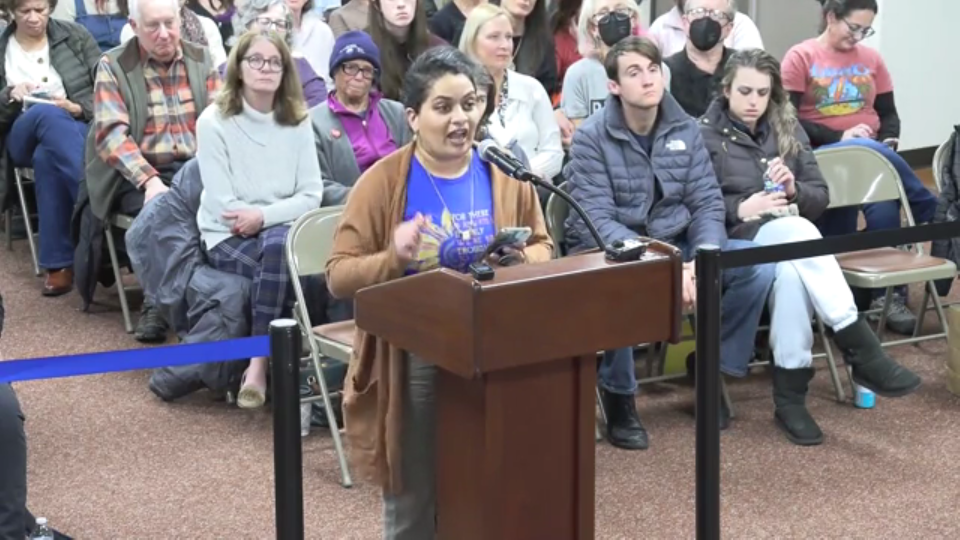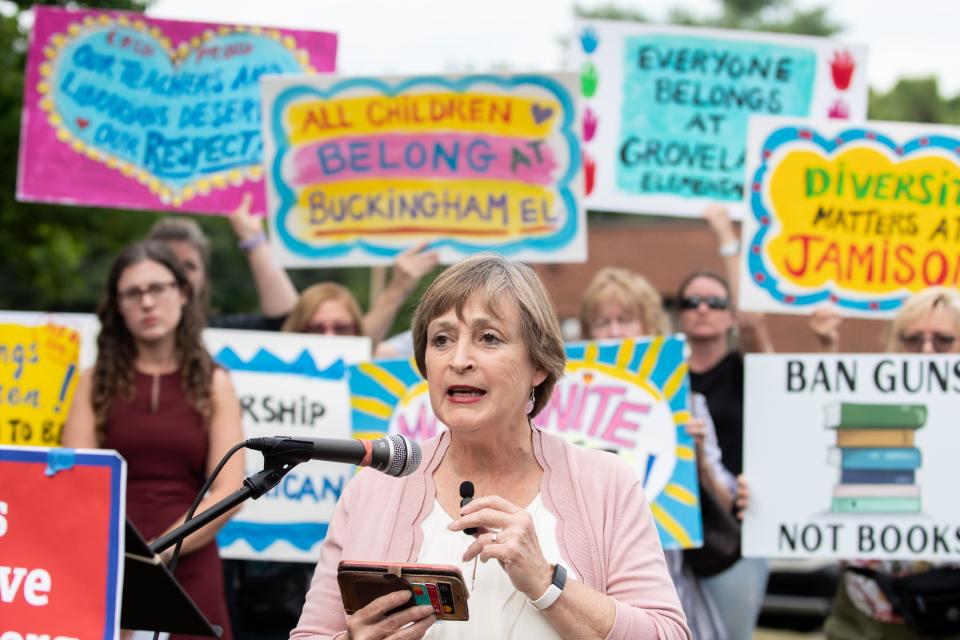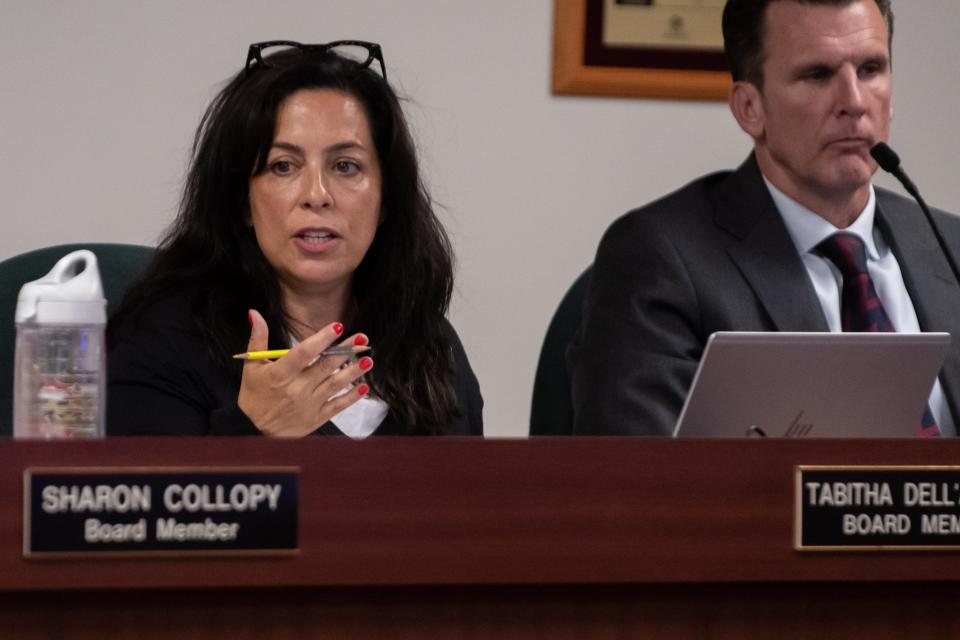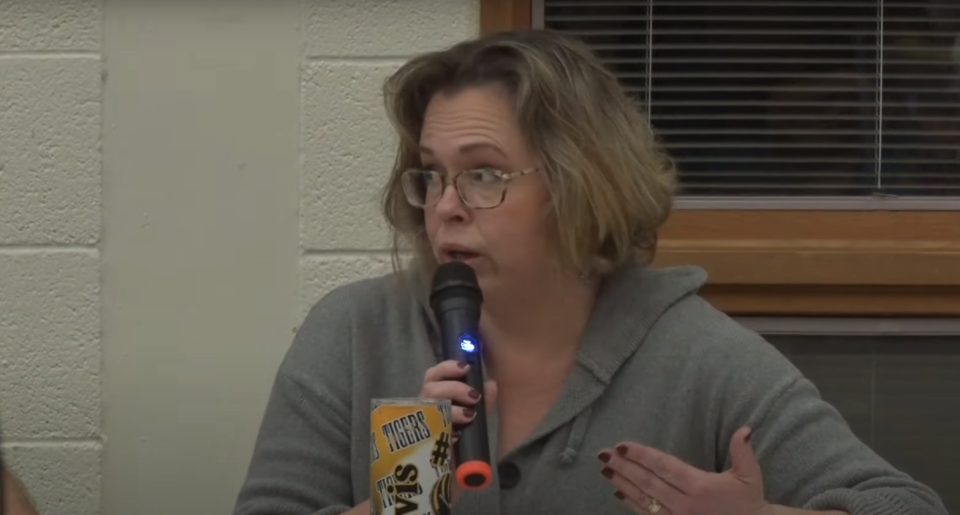At risk in Pennsylvania schools - books, political talk, LGBTQ policies
One of Pennsylvania’s largest school districts has become a culture war arena, favoring a parental rights movement to block political correctness and “woke” ideologies by banning books and limiting "political" discussions in classrooms.
Even as Central Bucks School District faces a federal investigation for allegedly creating a “toxic” learning environment for LGBTQ students, other school districts across the state are following its lead.
Public school board meetings across the state have turned into heated clashes over gay pride flags, what teachers can and cannot discuss in class and books that some are calling “sexually explicit.”
To their supporters, these controversial policies are protecting children from "grooming" by "sexual predators," “neo-Marxists” and "immoral delinquents" that have a stranglehold on public education.
Anusha Viswanathan says the district has brought right-wing political agendas into Central Bucks like a Trojan Horse. She's a parent and local pediatrician, one of dozens of parents and students who regularly attend board meetings to protest those policies.
“It feels like, at this moment, something was brought into our schools by people who should have been on the side of protecting public education, and then unleashed by (the majority of the school board’s) invitation,” Viswanathan told the USA Today Network last month.

Viswanathan has been a regular at meetings since July 2021, when she joined a group of other local doctors and at least one student urging the district to require masks at school. The press conference became a confrontational event as a group of parents, fighting to rid the district of most pandemic restrictions, gathered around and behind the doctors’ podium.
One student was told to “go back home” when she described how the coronavirus was still ravaging areas of India, her parents’ native country.
Viswanathan, who is also Indian, endured similar vitriol.
The Central Bucks community had long been divided over pandemic rules at that point. Board meetings that previously lasted an hour became two- to three-hour slogs stretched out by angry parents wanting a return to pre-pandemic conditions, regardless of how the virus was spreading.
That ire over mask mandates and quarantine guidelines created a cascading effect of political debate, board members forming conservative voting blocs and the influence of far-right and often religious organizations directing policy changes.
In a 6-3 vote …
Last summer saw the start of what would become a whirlwind of changes in Central Bucks.
In early May, a middle school teacher was suspended for allegedly helping a transgender student report bullying that went ignored by administrators. At about the same time, the district’s superintendent called for a removal of pride flags in some schools.
Most of the 40-plus people who spoke at the board’s May 10 meeting voiced support for the middle school teacher, Anthony Burgess, as several current and former district students decried the superintendent’s characterization of pride flags as “political symbols.”

The district had also just canceled its human growth and development classes, lessons about puberty for fourth- through sixth-graders with separate classes for boys and girls. In past years the district allowed students to choose which class they attended. A complaint that a trans student was in the class of their identified gender allegedly prompted the district to pull the classes.
The district eventually made those classes entirely online and optional.
Central Bucks officials called reporting around most of these events “false narratives" that only told part of the story, though those same officials rarely provided more context in public statements.
A new library policy that saw growing opposition passed in a 6-3 vote in late July. Policy 109.2 would prohibit materials with “sexual” content, implied or explicit, from being purchased and allow any of roughly 120,000 residents in Central Bucks to challenge the district's existing collection of library books.
The policy could also prevent the donation of books if the materials didn’t conform to an undefined “principles of selection” and included “visual or visually implied depictions of sexual acts or simulations of such acts.” Groups like the Education Law Center and the National Coalition Against Censorship (NCAC) lambasted the policy as a gateway for people to ban books simply because they didn’t like the subject matter.
Gay and trans students implored that they and other students, LGBTQ or otherwise, need access to books that represent their experiences.
The three school board members who voted against Policy 109.2 repeatedly criticized it as a solution without a problem that offered to placate a loud minority at the expense of vulnerable students.
The board voted 6-3, passing a similar policy for “age-appropriate standards” for textbooks on Aug. 9. Under that policy, books that contain information “about the procreative sex act” are admissible in middle and high school health and science classes.
As the current school year began, administrators handed down a directive in at least one middle and one high school, instructing teachers to ignore a student’s request to use a different name or gender in class. Some teachers told the USA Today Network that they refused to follow that order and another order to report those students to school counselors.
The district defended that directive as a strict adherence to following student information on file in its records.
Barely two weeks after that, board members introduced Policy 321 at a September policy committee meeting, which included updated rules prohibiting “political symbols” in classrooms and restricting discussions on “social policy” unless it had to do specifically with that day’s lesson plan.
That policy, again, passed in a 6-3 vote.
Those policies and directives would make up much of a 72-page complaint filed on behalf of seven students by the ACLU of PA in October. The U.S. Department of Education’s Office of Civil Rights is currently investigating the complaint.
More:ACLU alleges 'toxic environment' at Central Bucks School District for LGBTQ+ students
From Woke PA to Policy 109
Not long after the 2021 election, a new website called Woke in Bucks County emerged with a list of library books the group said encouraged pedophilia.
The site borrowed its layout from larger groups like Parents Defending Education and No Left Turn In Education, two national organizations opposing the teaching of left-leaning ideas and the often mischaracterized subject of critical race theory.
Critical race theory, in broad terms, is a 40-year-old form of legal analysis examining racism in America. Over the decades, the school of thought has branched into other social sciences, examining systemic racism, and its impact, even with laws meant to end discrimination.

The subject soon became a target in right-wing politics, often shortened to CRT, as a shorthand for diversity training and myriad other topics that don't involve deep, critical analyses.
With its motto, “Stop the grooming,” on every page, Woke at Bucks County listed about 15 books, most of them focused on LGBTQ issues.
The term "grooming," as Woke PA and other groups use it, refers to the practice of forming a relationship with a minor for the purpose of sexually assaulting them.
Woke PA's website currently describes Central Bucks library policy as actively fighting grooming, implying certain books are used to encourage sexual relationships between minors and adults.
The website also included images of a “Rainbow Book Rack” from inside a Central Bucks classroom, screenshots from a video recorded that summer and shared among a closely knit group of residents.
Sometime after its creation in November and early January 2022, Woke at Bucks County became Woke PA. A slightly revised website now included a handful of Montgomery County school districts and sections listing other counties in the commonwealth.
The group has since added empty pages for potential Woke chapters across the country, waiting for volunteers.
Woke PA’s presence is difficult to track, as no social media pages were created for the website and it never lauded membership counts. Still, its influence, at least in Central Bucks, is clear.
An audio clip from a Central Bucks committee meeting showed the Rainbow Book rack video had raised eyebrows of some officials who then began questioning what was in their district libraries.
As discussions began to develop a new process for residents to challenge books, a group of more than a dozen residents went to a March 8 board meeting to recite excerpts of books, pulled off of Woke PA’s website — though never mentioning the group’s name.
Parents read out-of-context paragraphs like a depiction of child sexual abuse described in two pages of Toni Morrison’s “The Bluest Eye” and other books as they parroted Woke PA’s broader message of protecting children from sexual predators and decrying claims they were trying to ban books on LGBTQ issues.
While Woke PA itself insists it is not part of a hate campaign against any demographic or group, the content on its website suggests the organization is at least comfortable, to a point, with adopting language from groups that do.
Maia Kobabe’s autobiographical graphic novel "Gender Queer", a story about coming of age as a nonbinary person, was one of the more controversial readings in Central Bucks last March.
Kobabe’s book wasn’t initially written for young adult audiences but it has since been considered important reading for young adults and teenagers by organizations like the Young Adult Library Services Association, a division of the American Library Association (ALA). The book touches on many of the typical trials of growing up, including puberty and sex. Critics of the book have cited several of its 241 pages as being too sexual or graphic for children of any age.
The page on Woke PA’s website that includes several allegedly obscene images and a description of "Gender Queer," however, were taken directly from another website.
Woke PA lifted its images and description straight from the website of a group called Mass Resistance, a parental rights advocacy group that touts ending “transgender madness” as one of its main goals. The Boston-based organization is designated an anti-LGBTQ hate group by the Southern Poverty Law Center as well.
Mass describes "Gender Queer" as “a revolting graphic biography of a young female who wants to be male, but has to figure out how to incorporate her female body into that fantasy.”
At the time those Central Bucks residents were describing "Gender Queer"last year, they were reading a slightly revised version of the book and using excerpts from Mass Resistance.
Woke PA had removed the word “revolting” and changed “fantasy” to “idea” on its website in an apparent effort to sanitize the language.
Independent book ban researcher Tasslyn Magnusson said the transformation of Central Bucks, from an apparent grassroots effort manufacturing outrage to the adoption of conservative policies quashing LGBTQ representation, is just one example of sweeping changes of school districts across the country.
“Everything is being broken, rapidly,” Magnusson said.
The Playbook
Books about systemic racism were popular targets of book challenges two years ago, following nationwide discussions around police brutality and equity after the 2020 murder of George Floyd by four Minneapolis police officers.
While progressives in local governments and school districts considered evaluating equity, conservatives warned of lawlessness through defunding police departments and anti-police indoctrination in schools.
In the wake of the division, the Central York School District, York County, pulled a long list of books, mostly about anti-racism, in 2020 with the intention of returning the books to libraries once they were reviewed for any questionable content. About a year later, none of the reviews had been completed, and students led protests against what became a de facto book ban.
Central York reversed its book freeze near the beginning of the 2021-2022 school year, about the same time Magnusson began tracking organizations and individuals leading book challenges across the country.
Her Censorship Attacks database, which the poet and children's literature author still maintains, is a collection of challenged titles, school districts where those challenges occur and a vast network of groups behind those attempted book bans. The nonprofit research and public policy organization EveryLibrary listed Magnusson's work as a research tool on its website in late 2021.
In January 2022, Magnusson was contracted by the nonprofit anti-censorship group PEN America to support a project investigating the state of library policies in school districts.
Early in her research, Magnusson found that many school districts had policies “rooted” in best practices from the library association and similar groups, but they often didn’t follow their own rules when faced with a relentless onslaught of complaints.
“(The policies) were balancing both the need to protect the individual’s right … but also to allow families opportunities to challenge books that they might not want their children reading,” Magnusson said. “The whole process that these districts set up were for one, two or 10 challenges at a time; not 20, 60, or 100.”
In early 2022, the pressure from national organizations began to shift toward sexuality and gender as groups like Moms For Liberty, No Left Turn in Education and Parents Defending Education began publishing their own lists of questionable titles.
“By the spring, everybody is sort of on the same page with the same 50 to 100 books,” said Magnusson.
The ALA reported last April that 2021 saw 729 book challenges targeting 1,597 titles, a total double the previous year’s challenges, a record high since the ALA began tracking book bans in 2000. LGBTQ books accounted for a third of all challenges that year.
The frozen-book list in Central York made up the bulk of Pennsylvania's challenges, according to an analysis by PEN America.
“I think at first we saw so much of ‘Gender Queer’ being banned because it was easy for librarians to say, ‘OK, you can have that book, but I’m going to keep all of the rest of the gay books for my kids. Go ahead, take that one,’” Magnusson said.
“They think if they give a little, it’ll go away. But it’s not. It’s an extremist movement that’s incredibly threatening,” Magnusson added.
Appeals to morality, spreading misinformation and framing policy language as neutrality are other common tactics used in districts Magnusson has followed.
When it comes to censorship, the school library, which could be for some students their only source for literature, is where losing one fight over a book could be detrimental to students.
“You don’t have to be nonbinary to find ‘Gender Queer’ moving and important to read … You’re closing off worlds for students who need access to the world that exists, not the world their parents imagine should exist,“ Magnusson said.
Central Bucks: Leading the way
Despite the criticism over the library policy in Central Bucks, officials in other school districts seemed inclined to follow its lead.
In the Penncrest School District, Crawford County, a five-member majority just two months ago approved updating its Policy 109.2 with a hyperfocus on sexually explicit material that drew comparisons to Central Bucks.
A proposed change to the policy caused some members of the board to question if some of their colleagues were deliberating behind closed doors.
“Clearly, there’s members of the board who are meeting on evenings when we are not present … Are we all supposed to pretend that nobody is noticing that you all figured this out before you got here?” board member Jennifer Davis said before the vote.
Davis was referring to an addition made by another member that cited a criminal statute by its number and not its language. A few board members asked the solicitor to explain the law, which was related to child pornography.
The fact that a majority of the board seemed to already know what the statute referred to was evidence that there had been some prior discussion, Davis implied.
Under Pennsylvania’s open meetings law, the Sunshine Act, a simple majority of an elected board cannot deliberate or vote on public business outside of a public meeting.
When the board later opened the floor to board member comments, Davis said the vote for Policy 109.2, which she said she previously supported, was one of her last.
“I’ve left a number of the board meetings, probably the last five or six, that I’ve written my resignation letter in my head on the way home. Because I’m not a quitter and I’m truly dedicated to the students in this district, I threw those letters out,” Davis said. “You pushed me over the edge tonight. I’m done.”

During the meeting, school board member and policy committee chairman David Valesky denied Davis’ claims.
“There’s been a policy committee meeting, and there’s been public meetings. There is no violation of the Sunshine Act,” Valesky said.
Davis wasn’t alone in her aggravation over the policies.
Emails provided to the USA Today Network from a district parent who obtained them through a records request show mounting concerns among at least three other board members. (The text of the emails is being presented as written.)
One of the concerned board members was Amber Tyson Wright. In an email to Valesky, she referenced a letter from a resident that made her want to delay the vote on Policy 109.2.
“Because of the letter sent by the concerned parent, I reread the new policy and tend to agree that maybe the words ‘elements’ and ‘sexualized’ may have to have to be way more specific and reflect the law better,” Wright told Valeksy. Wright also questioned including “depicting minors in a sexual act” in the policy.
Valesky responded that afternoon saying there’s no way to make a “bulletproof” policy.
“Our founding fathers worked tirelessly at setting up a government to honor God and create freedom, however at the end of the day it comes down to the hearts of the people … I’m not saying we don’t try our best, but there’s only so much we can do,” Valesky replied.
Wright again pushed to delay the vote and revise the policy “to use more specific language to word-by-word reflect the law.”
“I honestly don’t care what the law says, as long as what I present is right before God. They can change the word at any time in state and federal laws,” Valesky said.

In the days that followed the 5-3 vote, over 100 books were pulled for review as the district conducted an internal review of titles that included “To Kill a Mockingbird,” “The Canterbury Tales” and the Holy Bible.
In Warwick School District in Lancaster County, the school board considered a “decency standard” for months championed by the county’s Moms For Liberty chapter head, according to emails provided by the district via a Right to Know Law request.
In those emails, the district redacted the names of anyone who was not a school employee or elected official but many emails include a signature identifying one sender as the local group’s leader.
“Here is another library policy, this one is already active in Central Bucks School District, which does seem to be ‘leading the way’- per their motto,” reads a Sept. 16 email to the school board.
“This is such a playbook, it’s just so frustratingly predictable,” said Warwick parent Kayla Cook said in an interview with the USA Today Network last month.
Cook said the school board slowly moved towards “decency” standards for libraries and textbooks late last summer.
It wasn’t until October that discussions surrounding sexual content and requiring parents to “opt-in” to allow their child access to certain materials fizzled out.
“I think the only reason that we were successful was because the (policy supporters) in our community came in so heavy and extreme and flat out like batshit crazy that it turned even our conservative board members moderate,” Cook said.
The documents also show that school board member Jim Koelsch had a “breakfast meeting” with PA Family Institute COO and Chief Counsel Randall Wenger on Jan. 27 at the Lititz Family Cupboard.
The religious liberty organization is a state chapter of the Family Research Council, recognized as an anti-LGBTQ hate group by the Southern Poverty Law Center.
“Thank you for your time and insights this morning. Your insights will be very helpful navigating the coming weeks/months on the board,” Koelsch wrote to Wenger the next day.
The PA Family Institute and its legal arm, the Independence Law Center (ILC), were quietly involved in the development of the administrative regulations for the Central Bucks library policy.
The ILC unsuccessfully sued Boyertown Area School District in 2017 to overturn its policy allowing students to use bathrooms and locker rooms of the gender they identified as.
Koelsch told Wenger in an earlier email that board member Emily Zimmerman, whose ties to Moms For Liberty have previously caused calls for her resignation, would also like a one-on-one meeting with the institute.
Trans athletes could be next
The same night that Penncrest passed its library policy, the board also implemented a change to its interscholastic athletics policy.
It was a relatively small change adding the words "biological (at birth)" before the word "male" and “female” sports teams.
That added exception would mean that trans athletes would have to play on teams matching their assigned gender at birth, regardless of whether they are taking puberty blockers or other gender-affirming treatments.
The policy was modeled after one passed by the Hempfield School District, Lancaster County, last summer, a change the district developed with the ILC and the PA Family Institute.
A few months earlier, the Central Bucks policy committee hosted a presentation by Dr. Greg Brown, a professor of Exercise Science at the University of Nebraska Kearney, discussing why transgender athletes should only play on the teams of their gender assigned at birth.
Brown had testified in August at a state House Education Committee hearing in August in defense of a Fairness In Women’s Sports bill that was later vetoed by Gov. Tom Wolf.
His testimony then, similar to his presentation in Central Bucks, focused on the biological differences between men and women.
“Males have undeniable biologically based athletic advantages over females in almost all sports, and research currently indicates that neither transgender identity nor extended use of male-to-female hormones erases those advantages,” Brown is quoted in a PA Family Institute webpage.
The policy committee agenda listed Brown’s presentation as simply information about Title IX, the civil rights law that prevents sex-based discrimination in schools that are provided federal funding.
The committee, which is made up of the school board members, has not discussed any changes to the athletics policy.
Brown’s presence at the meeting would suggest a change is coming, and Central Bucks’ status as a conservative trendsetter suggests more districts could follow.
Chris Ullery can be reached at cullery@gannett.com.
This article originally appeared on Bucks County Courier Times: Anti-LGBTQ policies spreading in PA districts ahead of election

